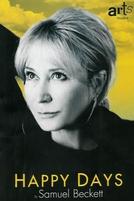Happy Days - Arts Theatre 2003
In 1976 the National Theatre moved into their new space on the South Bank and the first play performed was Peter Hall's production of Samuel Beckett's 'Happy Days' starring Peggy Ashcroft. Now twenty-seven years later he has revived Beckett's play with Felicity Kendell playing the character of Winnie.
Beckett's writings belong to the school of modern drama known as the 'Theatre of the Absurd', a style of theatre that looks at the world through the eyes of existentialism. And though 'Waiting for Godot' is seen as Becket's masterpiece for this particular genre, 'Happy Days' captures its essence.
And our existence is not so different from the unfortunate Winnie. The earth is not literally devouring us, but we are being devoured by time. Each day slips away, and our only certainty is death. And just as Winnie becomes more and more restricted as she sinks into the earth, so we also become more restricted the older we become. We have made those once happy choices about our partner, our career, our style of life, but now we have to live with those choices, unable to re-make them. We have to get through our life the best we can, but some discover that their life is not easy. To save ourselves from panic we try to cheer ourselves by saying "Life is not so bad!" and "It could be worse!"
Winnie is the eternal optimist struggling to ignore her terrible predicament. She rummages through her handbag to examine and re-examine her belongings in an absurd attempt to overcome her boredom. Though she realises she will soon disappear into the earth altogether, still she checks her makeup in the hand mirror, combs her hair and carefully positions a hat upon her head.
Though Winnie is trapped she is not alone, Willie (Col Farrell) her husband is with her. Unlike Winnie, he is not buried in the earth and remains free to move around, though he to is imprisoned. Winnie talks to her husband, but he remains unresponsive to her attempt at communication. He reads a newspaper, ignores her questions, and merely utters a few syllables occasionally. When he does speak, Winnie is elated "Oh, this is a happy day "she cries.
Felicity Kendal does her best with Beckett's gloomy script. One can feel her characters resolve not to give into despair, "This will be another happy day!" she declares with a smile. But behind the smile one can see the clenched teeth and tense jaw pushing down the sense of panic. Sadly, in the second act when only Winnie's head remains in view, there is no growing sense of panic. There is no final herculean effort to remain buoyant, nor does her voice sound desperate enough as she encourages her husband Willie to make one last effort to reach her. In the plays final moments she does not capture the tragedy of a meaningless life that will quickly be forgotten.
Happy Days is certainly not a play for most theatre goers who are likely to find it depressive and meaningless, and discover that Beckett's minimalist approach to drama is tediously boring. I know I did.
Production photo credit: Nobby Clark
What other critics had to say.....
NICHOLAS DE JONGH for THE EVENING STANDARD says, "Happy Days is overwhelming and here again." BENEDICT NIGHTINGALE for THE TIMES says, "Kendal's performance...I'd rate it as one of her best." MICHAEL BILLINGTON for THE GUARDIAN says, "The evening belongs to the new-minted Kendal."CHARLES SPENCER for DAILY TELEGRAPH says, "A great performance in an indisputably great play." IAN SHUTTLEWORTH for THE FINANCIL TIMES says, "Kendal gives more intimate and feeling voice than is usual in the role.The trouble is that I think this, too, is a mistake." PAUL TAYLOR for THE INDEPENDENT says, "Dramatic masterpiece."
External links to full reviews from popular press
The Times
The Guardian
Daily Telegraph
Financial Times
The Independent
Originally published on
